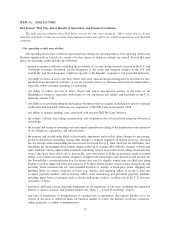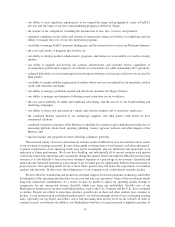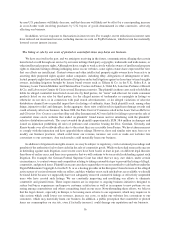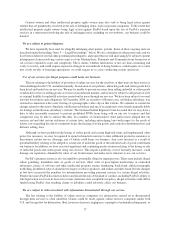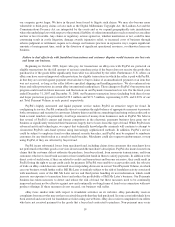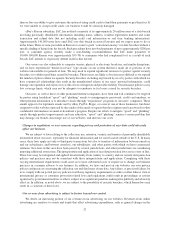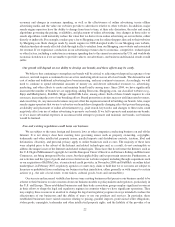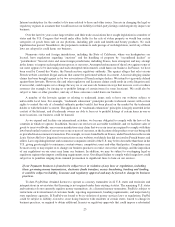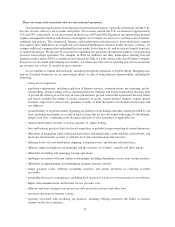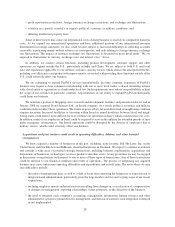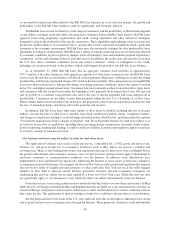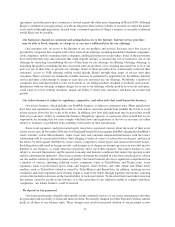eBay 2008 Annual Report Download - page 31
Download and view the complete annual report
Please find page 31 of the 2008 eBay annual report below. You can navigate through the pages in the report by either clicking on the pages listed below, or by using the keyword search tool below to find specific information within the annual report.Internet marketplace for the conduct of its users related to those and other issues. Success in changing the legal or
regulatory regimes in a manner that would increase our liability for third-party listings could negatively impact our
business.
Over the last few years some large retailers and their trade associations have sought legislation in a number of
states and the U.S. Congress that would make eBay liable for the sale of stolen property or would ban certain
categories of goods from sale on our platform, including gift cards and health and beauty products. No such
legislation has passed. Nonetheless, the proponents continue to seek passage of such legislation, and if any of these
laws are adopted it could harm our business.
Numerous states and foreign jurisdictions, including the State of California, where our headquarters are
located, have regulations regarding “auctions” and the handling of property by “secondhand dealers” or
“pawnbrokers.” Several states and some foreign jurisdictions, including France, have attempted, and may attempt
in the future, to impose such regulations upon us or our users. Attempted enforcement of these laws against some of
our users appears to be increasing and such attempted enforcements could harm our business. In France, we have
been sued by Conseil des Ventes, the French auction regulatory authority. The agency alleges that sales on our
French website constitute illegal auctions that cannot be performed without its consent. A lawsuit alleging similar
claims has been brought against us by two associations of French antique dealers. We intend to vigorously defend
against these lawsuits. However, this and other regulatory and licensure claims could result in costly litigation and,
if successful, could require us to change the way we or our users do business in ways that increase costs or reduce
revenues (for example, by forcing us to prohibit listings of certain items for some locations). We could also be
subject to fines or other penalties, and any of these outcomes could harm our business.
A number of the lawsuits against us relating to trademark issues seek to have our websites subject to
unfavorable local laws. For example, “trademark exhaustion” principles provide trademark owners with certain
rights to control the sale of a branded authentic product until it has been placed on the market by the trademark
holder or with the holder’s consent. The application of “trademark exhaustion” principles is largely unsettled in the
context of the Internet, and if trademark owners are able to force us to prohibit listings of certain items in one or
more locations, our business could be harmed.
As we expand and localize our international activities, we become obligated to comply with the laws of the
countries in which we operate. In addition, because our services are accessible worldwide, and we facilitate sales of
goods to users worldwide, one or more jurisdictions may claim that we or our users are required to comply with their
laws based on the location of our servers or one or more of our users, or the location of the product or service being sold
or provided in an ecommerce transaction. For example, we were found liable in France, under French law in the recent
Louis Vuitton Malletier litigation for transactions on our websites worldwide that did not involve French buyers and
sellers. Laws regulating Internet and ecommerce companies outside of the U.S. may be less favorable than those in the
U.S., giving greater rights to consumers, content owners, competitors, users and other third parties. Compliance may
be more costly or may require us to change our business practices or restrict our service offerings, and the imposition
of any regulations on our users may harm our business. In addition, we may be subject to overlapping legal or
regulatory regimes that impose conflicting requirements on us. Our alleged failure to comply with foreign laws could
subject us to penalties ranging from criminal prosecution to significant fines to bans on our services.
If our Payments business is found to be subject to or in violation of any laws or regulations, including
those governing money transmission, electronic funds transfers, money laundering, banking and lending,
it could be subject to liability, licensure and regulatory approval and may be forced to change its business
practices.
To date, PayPal has obtained licenses to operate as a money transmitter in 42 U.S. states and territories and
interpretations in seven states that licensing is not required under their existing statutes. The remaining U.S. states
and territories do not currently regulate money transmitters. As a licensed money transmitter, PayPal is subject to
restrictions on its investment of customer funds, reporting requirements, bonding requirements, and inspection by
state regulatory agencies. If PayPal were found to be in violation of money services laws or regulations, PayPal
could be subject to liability, forced to cease doing business with residents of certain states, forced to change its
business practices, or required to obtain additional licenses or regulatory approvals that could impose a substantial
23


